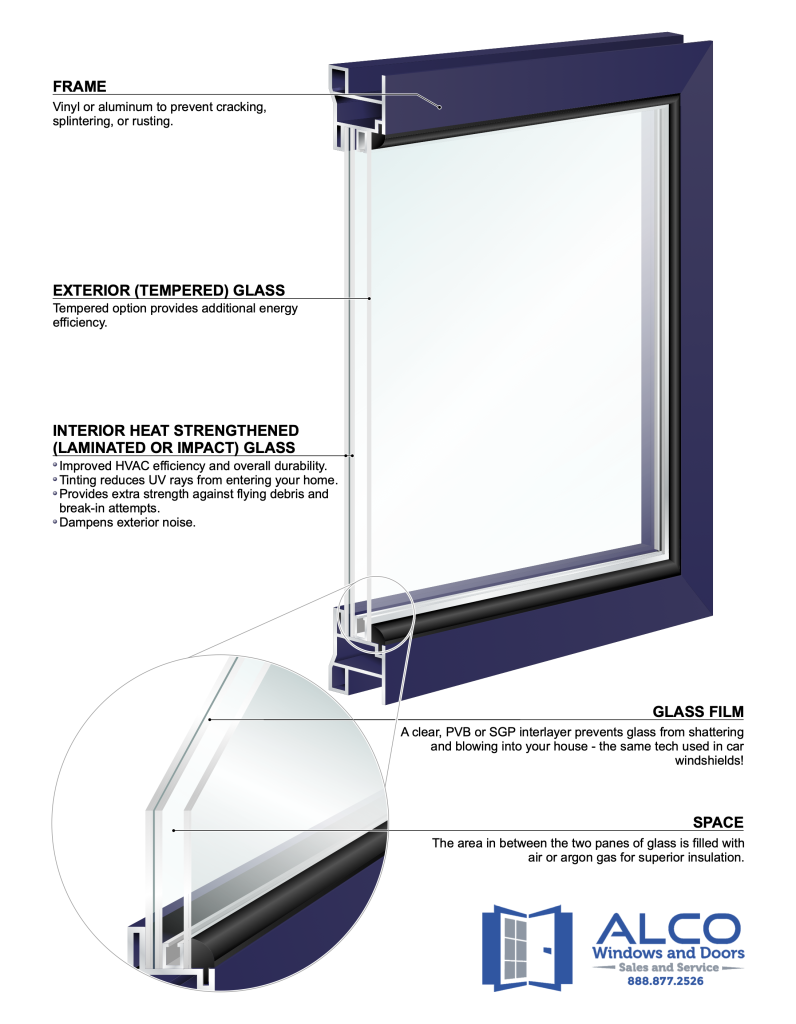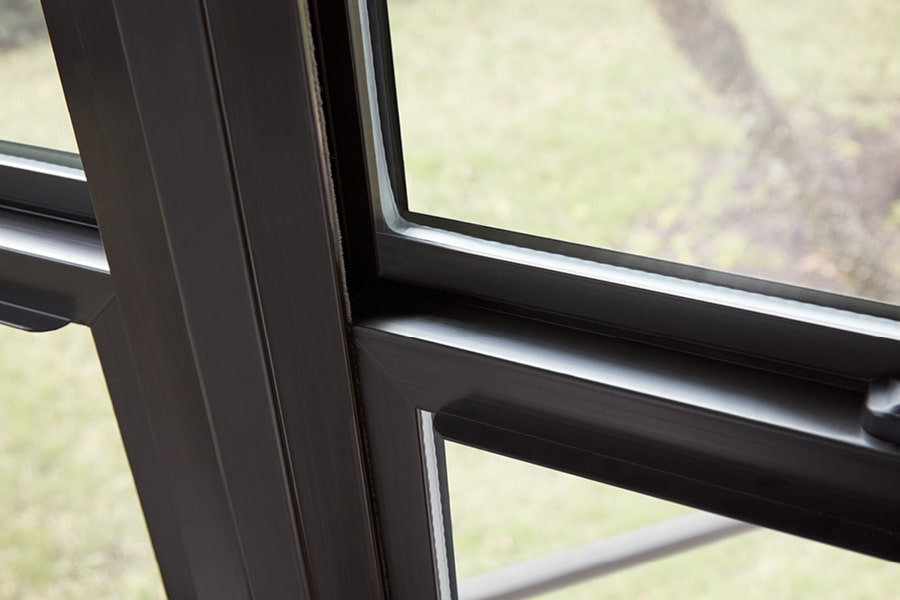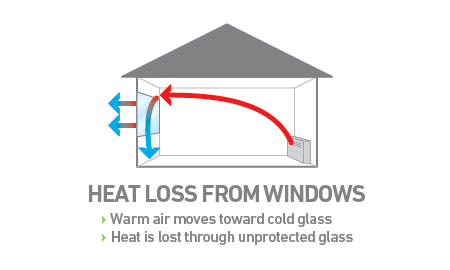In our article, we will explore the question of whether impact windows are effective at blocking heat. As homeowners, we often find ourselves searching for ways to keep our homes cool and comfortable during hot summer days. Impact windows have become a popular choice for many, as they offer increased protection against storms and break-ins. But do they also help in reducing the amount of heat that enters our homes? Join us as we delve into the science and mechanics behind impact windows, and discover if they can truly keep our houses cooler in the summer heat and reduce our reliance on air conditioning. So, if you’re curious to know whether investing in impact windows can make a difference in your home’s temperature, stay tuned!

This image is property of info.alcoimpact.com.
How do impact windows work?
Impact windows are an incredible addition to any home. They are designed to withstand strong winds, flying debris, and even attempted break-ins. But do they also block heat? In this article, we will explore the science behind impact windows and how they can contribute to a cooler and more comfortable living environment.
Laminated glass
One of the key components of impact windows is laminated glass. Unlike traditional windows, which are made from a single pane of glass, impact windows feature multiple layers of glass fused together with a durable interlayer. This construction makes them extremely strong and resistant to breakage.
Insulated frames
In addition to laminated glass, impact windows also utilize insulated frames. These frames are typically made from materials such as vinyl or aluminum, which have excellent thermal insulation properties. By combining insulated frames with laminated glass, impact windows create a barrier that minimizes the transfer of heat into and out of the home.
The role of laminated glass
Let’s delve deeper into how laminated glass works to block heat and enhance energy efficiency in your home.
PVB interlayer
The interlayer used in laminated glass is typically made from polyvinyl butyral (PVB), a plastic material that offers excellent adhesive and impact resistance properties. The PVB interlayer not only strengthens the glass but also acts as a thermal barrier, reducing heat transfer between the interior and exterior of the house.
Reducing UV radiation
Another significant benefit of laminated glass is its ability to block harmful ultraviolet (UV) radiation. UV rays can not only damage your furniture and flooring but also contribute to heat buildup inside your home. By blocking UV radiation, impact windows help maintain a cooler interior environment and protect your valuables from fading.
Heat absorption and reflection
Laminated glass also has the ability to absorb and reflect heat. When sunlight hits the glass, some of the heat is absorbed by the interlayer and dissipated. This reduces the amount of heat that enters the home. Additionally, the glass reflects a portion of the heat back outside, further minimizing heat transfer.
Benefits of insulated frames
While laminated glass plays a crucial role in blocking heat, insulated frames also contribute significantly to the energy efficiency of impact windows.
Thermal break technology
Insulated frames incorporate thermal break technology, which is designed to prevent heat transfer between the inside and outside of the window frame. This technology uses materials with low thermal conductivity that create a barrier against heat transfer. By reducing the transfer of heat through the frame, insulated frames help maintain a comfortable temperature inside the home.
Reducing heat transfer
Insulated frames work in conjunction with laminated glass to create a comprehensive insulation system. The combination of the two minimizes heat transfer through the glass and frame, resulting in a more energy-efficient home. This can lead to lower cooling costs and a reduced reliance on HVAC systems.
Condensation prevention
Another benefit of insulated frames is their ability to prevent condensation. Condensation occurs when warm, humid air comes into contact with a cold surface, such as a window. With insulated frames, the temperature difference between the interior and exterior surfaces is minimized, reducing the likelihood of condensation forming on the windows.
Reducing solar heat gain
In addition to blocking heat, impact windows also offer features that minimize solar heat gain, further enhancing their energy efficiency.
Low-emissivity coatings
Many impact windows are equipped with low-emissivity (low-e) coatings. These coatings reduce the amount of heat that is transmitted through the glass by reflecting it back outside. By blocking the sun’s infrared rays, low-e coatings help maintain a cooler interior temperature even in hot climates.
Argon gas fill
Some impact windows are also filled with argon gas between the glass panes. Argon is an insulating gas that has a higher resistance to heat transfer than air. The addition of argon gas further improves the energy efficiency of impact windows by reducing heat transfer through the glass.
Solar control properties
Impact windows with solar control properties offer an additional layer of heat reduction. These windows are designed to selectively block certain portions of the sun’s spectrum while allowing visible light to pass through. This helps maintain a comfortable level of natural light while minimizing heat buildup inside the home.

This image is property of madico.com.
Energy efficiency of impact windows
The energy efficiency benefits of impact windows go beyond reducing heat. Let’s explore how these windows can positively impact your energy consumption and overall comfort.
Lowering cooling costs
By blocking heat and minimizing solar heat gain, impact windows can significantly reduce the amount of energy needed for cooling. This translates into lower cooling costs during hot summer months. With impact windows, your air conditioning system doesn’t have to work as hard to maintain a comfortable indoor temperature.
Reducing reliance on HVAC
With impact windows providing excellent insulation, your home can maintain a more stable and comfortable temperature throughout the year. This reduces the need to rely on your HVAC system to adjust the temperature frequently. As a result, you can enjoy savings on your energy bills while also prolonging the lifespan of your HVAC equipment.
Improved insulation
In addition to blocking heat, impact windows also offer improved insulation against outside noise. The combination of laminated glass and insulated frames helps to reduce the transmission of sound, creating a quieter and more serene living environment. Improved insulation also means a more comfortable indoor temperature, regardless of external weather conditions.
Impact windows and heat transfer
To understand the heat-blocking capabilities of impact windows, it is important to consider two important factors: U-factor and Solar Heat Gain Coefficient (SHGC).
U-factor
The U-factor measures the rate of heat transfer through a window. The lower the U-factor, the better the window is at insulating against heat transfer. Impact windows typically have a lower U-factor compared to traditional windows, indicating their superior insulating properties.
Solar Heat Gain Coefficient (SHGC)
The SHGC refers to the amount of solar heat that can pass through a window. A lower SHGC means less heat is allowed to enter the home. Impact windows with low-e coatings and argon gas fillings generally have a lower SHGC, helping to block a significant amount of heat from the sun.
Testing standards for heat resistance
When selecting impact windows, it is essential to ensure they meet industry testing standards for heat resistance. The American Society for Testing and Materials (ASTM) has established specific criteria that impact windows must meet to be deemed effective against heat transfer. By choosing impact windows that meet these standards, you can have confidence in their ability to block heat and improve energy efficiency.

This image is property of images.contentstack.io.
Comparing impact windows with other options
While impact windows offer numerous advantages, it’s important to compare them with other options available on the market.
Traditional windows vs. impact windows
Traditional windows offer minimal protection against heat transfer and are prone to shattering during extreme weather conditions. impact windows, on the other hand, are designed to withstand high winds and impact. They provide superior insulation against heat transfer while offering added security and safety.
Window film and shades
Window film and shades can offer some level of heat reduction, but they often have limited effectiveness. Window film can peel over time, reducing its ability to block heat, and shades need to be closed to be effective. Impact windows, on the other hand, provide a permanent solution that offers continuous heat and UV blocking capabilities.
Benefits of impact windows
The benefits of impact windows extend beyond blocking heat. They provide protection against hurricanes, reduce outside noise, enhance security, and offer insurance premium discounts. When considering the overall value and long-term benefits, impact windows prove to be an excellent investment.
Considerations for selecting impact windows
When selecting impact windows for your home, there are a few key considerations to keep in mind.
Climate considerations
Different regions have varying climate conditions, including temperature ranges, humidity levels, and sun exposure. It is important to choose impact windows that are suitable for your specific climate to ensure optimal energy efficiency and heat blocking capabilities.
Choosing the right SHGC
The Solar Heat Gain Coefficient (SHGC) can play a significant role in determining the effectiveness of impact windows in blocking heat. Consider the SHGC ratings of different impact windows and choose one that aligns with your heat reduction goals.
Expert consultation
If you are unsure about which impact windows to choose, it is always beneficial to consult with a professional. Window specialists can assess your specific needs, provide recommendations, and ensure that the installation is carried out correctly, maximizing the heat blocking potential of your impact windows.

This image is property of images.contentstack.io.
Cost and return on investment
While impact windows may require a slightly higher initial investment compared to traditional windows, they offer various benefits that can contribute to a significant return on investment.
Initial investment
The cost of impact windows can vary depending on factors such as window size, design, and additional features. However, considering their durability, energy efficiency, and ability to withstand severe weather conditions, impact windows can prove to be a worthy investment in the long run.
Energy savings
The energy savings associated with impact windows can result in significant reductions in cooling costs. By blocking heat and minimizing the need for artificial cooling, impact windows can lead to lower energy bills and long-term savings.
Insurance discounts
In hurricane-prone areas, homeowners who install impact windows may be eligible for insurance premium discounts. Insurance providers recognize the added protection and security that impact windows offer, leading to potential savings on your insurance costs.
Conclusion
In conclusion, impact windows do indeed block heat and provide numerous benefits. The combination of laminated glass, insulated frames, and other energy-efficient features make them an excellent choice for homeowners looking to enhance the comfort, energy efficiency, and safety of their homes. By reducing heat transfer, blocking UV radiation, and minimizing solar heat gain, impact windows can contribute to a cooler, more comfortable living environment while also offering long-term cost savings and insurance premium discounts. So if you’re considering upgrading your windows, don’t overlook the heat-blocking capabilities of impact windows – they truly make a difference.

This image is property of assets.sustainability.vic.gov.au.
